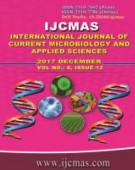


 National Academy of Agricultural Sciences (NAAS)
National Academy of Agricultural Sciences (NAAS)

|
PRINT ISSN : 2319-7692
Online ISSN : 2319-7706 Issues : 12 per year Publisher : Excellent Publishers Email : editorijcmas@gmail.com / submit@ijcmas.com Editor-in-chief: Dr.M.Prakash Index Copernicus ICV 2018: 95.39 NAAS RATING 2020: 5.38 |
Neonatal septicaemia is an important cause of morbidity and mortality among neonates constituting about 30 – 50% of total neonatal deaths in developing countries. Data from various studies reveal that results obtained vary from place to place and from period to period. Early diagnosis and proper management of neonatal septicemia can reduce the morbidity and mortality substantially. 1) To study the bacterial etiologic agents responsible for neonatal sepsis. 2) To study the prevalent bacterial pathogens isolated from early onset neonatal sepsis (EOS) and late onset neonatal sepsis (LOS). 3) To study risk factors associated with neonatal sepsis. 4) To determine the susceptibility pattern of isolates to the commonly used antimicrobial agents in the treatment of sepsis. Blood culture reports were studied in 369 cases of clinically suspected septicemia in neonates using the standard conventional techniques. The antibiotic sensitivity was performed by Kirby-Bauer's disc diffusion method. In our study 66.93% had early onset sepsis and 33.06% had late onset sepsis. Male cases (63.95%) outnumbered female cases (36.04%). Premature rupture of membrane was the most common maternal risk factor (21.95%), while low birth weight was most common neonatal risk factor (70.73%).Blood culture reports were positive in 37.94 % of cases. Klebsiella pneumonia and Enterococcus faecalis were the commonest organisms causing neonatal sepsis in EOS while Pseudomonas aeruginosa and Coagulase negative staphylococcus species in LOS. Continued surveillance of neonatal sepsis should be done in order to follow closely changes in trends and risk factors, to obtain information for empiric antibiotic therapy and to react rapidly in case of major changes in susceptibility patterns and occurrence of outbreaks.
 |
 |
 |
 |
 |